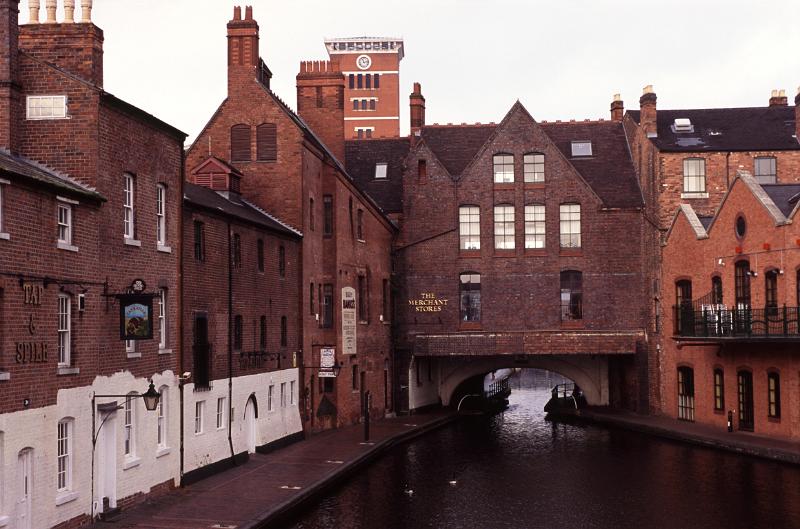 |
| A few of my Mountney ancestors |
I imagine them on longboats, lying on their backs, moving the boats through canal tunnels using only their legs. I imagine brightly-painted boats, when they were probably covered in coal dust. I imagine the Mountneys as rough scoundrels, hard-working-and-hard-fighting men, with little time for women's frills and lace...When my great-grandmother Sarah Anne was 14 years old, in 1871, she was back in Leicestershire, staying with her maternal grandparents, the Goulds of Great Dalby, and working as a domestic servant. She later met and married George Riley of Queniborough, tying the knot on Christmas Day, 1875.
I don't know why Sarah Anne went to stay with her grandparents... maybe she was being saved from the mischief cooked up by her brothers. (When her grandfather, John Gould died in 1872, he left Sarah Anne a legacy of five pounds to be given to her at 21 years of age. There is no explanation in the will as to why she was singled out for this.)
Sarah Anne was the eldest child, and her siblings were William, John, Henry, Mary Elizabeth, and George, all born between 1859 and 1865, all in or near Birmingham, Warwickshire. Mary Elizabeth returned to Leicestershire too, living in Queniborough in 1881, where she worked as a housemaid at The Coppice: the big house at the end of the very-same long avenue of horse-chestnut trees, Coppice Lane, where my dad often took my sisters and I to collect conkers! By 1887, Mary Elizabeth was in Philadeliphia, USA, married to Alfred Woolston of Rothley, Leicestershire. Another mystery: I'd love to know what drove their emigration... a desire for a new life in a new country. or a business opportunity, or horses? (Alfred was a groom.) Or... further away from the naughty Mountney brothers!
And why do I think they were so naughty?
- William and John were sent to trial for larceny in 1878, and received sentences of eight months and six months. I think this was for the theft of four cases of salmon from the London and North Western Railway (here's a transcript of the newspaper article in the Birmingham Post, see article 658. Thanks to http://www.spellweaver-online.co.uk)
- John came out of jail and then went back in, in 1879, this time charged with petty larceny and being asked to serve four more months inside (I haven't found the crime, yet)
- And Henry? Henry... in 1879, our Henry was in Brownhills' prison, Birmingham, Warwickshire, for committing simple larceny after a previous conviction for a felony. At 17!!! Guess what he stole. It's OK, they recovered the property. An ass. He stole an ass.
The Birmingham Police Gazette newspaper stated that Henry was "fresh-faced", all of 5' 5" tall (without shoes), with grey eyes, slender build, and a cut mark near his right eye. Henry said that he had recently been at the Dog and Gun public house in Belgrave, Leicester, but it's not clear whether he was so drunk that he stole the ass by mistake, or if he had missed his boat and decided to take the ass instead of walking the long way home to Birmingham. Whatever the reason, there he was, in jail, a villain with a scar near his eye.
 |
| Birmingham Canal. Image by PhotoEverywhere.co.uk |
But Henry made good. At least, he tried. On 15th August, 1881, Henry signed up to join the Leicestershire Regiment. He'd grown 3/4" and now measured five feet, five and three-quarter inches tall, weighed 140 pounds, and had the blue-grey eyes that many of the Toon family have today, myself included. He had light brown hair, and was considered fit to sign up and serve Her Majesty (Queen Victoria) for twelve years (seven years in Army service, five in the Reserves). He served in Malta, Egypt and Gibraltar. Apart from a few days AWOL and an incident of "resisting" early in his service in 1881, his conduct was noted as good by his commanding officer, according to his military paperwork. He was transferred to the Oxfordshire Light Infantry in 1882, and then to the South Staffordshire Regiment in August of the same year, which is where, as far as I can see, he remained. Henry received a medal for his participation in the Egyptian campaign of 1884-5. Henry was released to the Reserves on 18th May, 1889, and then discharged from service on August 8th, 1893. He did, indeed, serve a full 12 years.
In April, 1890, Henry had married Ann Grimmett nee Butler, a widow who had already given birth to three children: a daughter, Anne Grimmett, and two sons, Joseph and William. Anne was several years older than Henry, and as far as I know, they did not have any children together. They lived on Tyndal Street in Birmingham, with Henry back to his trade as a boatman... but on 24th May, 1902, our Henry was arrested in Hopwas, Staffordshire, for being drunk and disorderly, and fined 5 shillings plus costs, according to the Tamworth Herald newspaper. Hopwas is on the Birmingham and Fazely Canal and had the usual canal-side public houses. You can't keep a good man down.
Henry passed away in late 1918, in Birmingham, aged 56. I bet he still carried a sparkle in his blue-grey eyes.
,
There are some wonderful stories about boatmen, and the canal boat life, including more villany, here on Spellweaver. Congratulations to Alan and Angela for pulling all of this information together--the newspaper articles are so very helpful!
(Note: Mounteny is a name that is often spelled differently, or is incorrectly transcribed. I've found Mountneys, Mounteneys, Mountains, Mauntenys... and they are not all found with a "similar" search.)


No comments:
Post a Comment